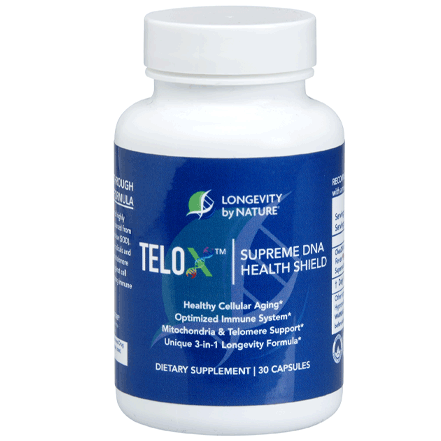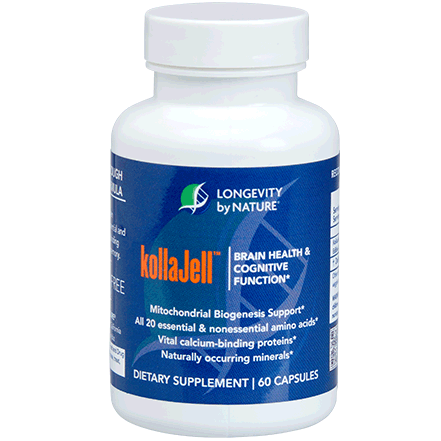FREE SHIPPING ON ORDERS OVER $100
Unlock the secrets to graceful aging with Telos95™. Infused with natural polyphenols, this antioxidant blend shields telomeres (the protective endcaps on chromosomes) and delays cellular health for vitality and age-defying radiance.*
$79.95 – $195.85
Telos95 is a clinically proven anti-aging telomere lengthening & lowering cellular age supplement consisting of an advanced proprietary plant-based blend of highly therapeutic polyphenols, that are naturally isolated from grapevine and organic olive leaf. These phytochemical compounds fight free radicals to maintain the health of the cells from becoming Senescence Cells (death of cells). Cell Senescence causes premature aging and eventually diseases. Promote telomere health, cellular longevity, and protects against Cell Senescence.
TELOS95 is a telomerase support supplement isolated from plants and is based on a naturally sourced blend of organic olive leaf & Grapevine which are highly purified into active Super polyphenol compounds.
Telos95™ 95mg
Revers e-Vine (Grapevine Extract) 50mg
Other Ingredients: Hypromellose veggie capsules. No fillers.
Recommended Use: Take 1 capsule daily with a meal.
No FAQ found for this product.
 5 Reviews
5 Reviews

sdf

Since 8 years ago, when I found out that I had breast cancer, I didn't believe in and didn't eat health food at all. Because I've tried many different health foods, it didn't help me at all. Earlier this year, my family suggested that I try Telos95 and KollaJell to improve my insomnia and anxiety problems for many years. They told me that they are completely natural and new functional food supplements. 3 months later, my family and friends told me that I seem to be a completely changed person. The spirit, mood, and radiance of the whole person have been completely improved. Thank you family for discovering such a good health food.

End of last year I dispatched two functional food supplements- Telos95 and KollaJell to my 85 years old father who is a prostate cancer patient for more than 15 years. The reason I am doing it, because I personally believe nature food grade supplements do play very big roles in helping malnutrition, although we might not realized most of us are, especially for chronicle disease patients.
Three months later I got phone calls from my dad and asked me to mail him 3 more months of products. He mentioned the results of his routine check up came out great and he could get on car without helps. The most amazing thing is that his vision is getting clear and sleeping quality is improving. His is very convinced by those improvements.

Started taking some time back and noticed it really did help with the benefits listed. I then tried competitor supplements for telomeres and they are less expensive but I could not even tell if I was taking anything - they did nothing. If you are interested in looking and feeling younger, longevity by nature has superior quality products - do not waste your money on the other competitors, they do not work. I recommend Telos95 and take it myself every day.

I've been using Telos95 when people get sick around me as a prevention. I never get sick. Actually, when I stopped taking it, I got the flu. So it's definitely working. Also helps when I feel a cold coming, the next day, it's gone.
 TeloX Supreme DNA Health Supplement
TeloX protects against epigenetic cell mutation, DNA damage, and boost immune system.
$99.00
Learn More
This product has multiple variants. The options may be chosen on the product page
TeloX Supreme DNA Health Supplement
TeloX protects against epigenetic cell mutation, DNA damage, and boost immune system.
$99.00
Learn More
This product has multiple variants. The options may be chosen on the product page
 Olea25®
Hydroxytyrosol supplement offers benefits for cellular longevity and cardiovascular health
$29.95 – $63.95
Learn More
This product has multiple variants. The options may be chosen on the product page
Olea25®
Hydroxytyrosol supplement offers benefits for cellular longevity and cardiovascular health
$29.95 – $63.95
Learn More
This product has multiple variants. The options may be chosen on the product page


 Pure Marine Collagen Peptide™ 200 Gram Powder
Hydrolyzed Fish Collagen peptide powder revitalizes skin, hair, nails & provides body wellness
$29.95
Add to cart
Pure Marine Collagen Peptide™ 200 Gram Powder
Hydrolyzed Fish Collagen peptide powder revitalizes skin, hair, nails & provides body wellness
$29.95
Add to cart
The information provided on this website is intended for educational purposes only. The educational material contained in this site is based on a careful analysis of the scientific literature and the experience of the Longevity by Nature® Sciences team. Our ingredients are cutting edge science and knowledgeable scientists have differing views as to its benefits and safety. We urge each prospective client to become educated about our ingredients and to consult their own experts prior to using any products that are true Anti-Aging, Health Mobility, Beauty dietary supplements. These products are not intended to diagnose, treat, cure, or prevent any disease.
Great news! You have just unlocked 15% off your next order. Simply use the code below:
Welcome15


